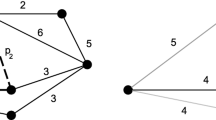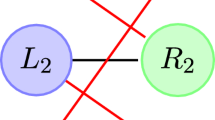Abstract
Consider the seller’s problem of finding optimal prices for her n (divisible) goods when faced with a set of m consumers, given that she can only observe their purchased bundles at posted prices, i.e., revealed preferences. We study both social welfare and profit maximization with revealed preferences. Although social welfare maximization is a seemingly non-convex optimization problem in prices, we show that (i) it can be reduced to a dual convex optimization problem in prices, and (ii) the revealed preferences can be interpreted as supergradients of the concave conjugate of valuation, with which subgradients of the dual function can be computed. We thereby obtain a simple subgradient-based algorithm for strongly concave valuations and convex cost, with query complexity \(O(m^2/\epsilon ^2)\), where \(\epsilon \) is the additive difference between the social welfare induced by our algorithm and the optimum social welfare. We also study social welfare maximization under the online setting, specifically the random permutation model, where consumers arrive one-by-one in a random order. For the case where consumer valuations can be arbitrary continuous functions, we propose a price posting mechanism that achieves an expected social welfare up to an additive factor of \(O(\sqrt{mn})\) from the maximum social welfare. Finally, for profit maximization (which may be non-convex in simple cases), we give nearly matching upper and lower bounds on the query complexity for separable valuations and cost (i.e., each good can be treated independently).
Access this chapter
Tax calculation will be finalised at checkout
Purchases are for personal use only
Similar content being viewed by others
References
Afriat, S.N.: The construction of utility functions from expenditure data. Int. Econ. Rev. 8(1), 67–77 (1967)
Agrawal, S., Devanur, N.R.: Fast algorithms for online stochastic convex programming. In: Proceedings of the Twenty-Sixth Annual ACM-SIAM Symposium on Discrete Algorithms, pp. 1405–1424. SIAM (2015)
Allen-Zhu, Z., Orecchia, L.: Linear coupling: an ultimate unification of gradient and mirror descent. arXiv preprint arXiv:1407.1537 (2014)
Amin, K., Cummings, R., Dworkin, L., Kearns, M., Roth, A.: Online learning and profit maximization from revealed preferences. In: AAAI, pp. 770–776 (2015)
Babaioff, M., Dughmi, S., Kleinberg, R., Slivkins, A.: Dynamic pricing with limited supply. ACM Trans. Econ. Comput. 3(1), 4 (2015)
Balcan, M.-F., Daniely, A., Mehta, R., Urner, R., Vazirani, V.V.: Learning economic parameters from revealed preferences. In: Liu, T.-Y., Qi, Q., Ye, Y. (eds.) WINE 2014. LNCS, vol. 8877, pp. 338–353. Springer, Cham (2014). https://doi.org/10.1007/978-3-319-13129-0_28
Beigman, E., Vohra, R.: Learning from revealed preference. In: Proceedings of the 7th ACM Conference on Electronic Commerce, pp. 36–42. ACM (2006)
Besbes, O., Zeevi, A.: Dynamic pricing without knowing the demand function: risk bounds and near-optimal algorithms. Oper. Res. 57(6), 1407–1420 (2009)
Besbes, O., Zeevi, A.: Blind network revenue management. Oper. Res. 60(6), 1537–1550 (2012)
Blum, A., Mansour, Y., Morgenstern, J.: Learning what’s going on: reconstructing preferences and priorities from opaque transactions. In: Proceedings of the Sixteenth ACM Conference on Economics and Computation, pp. 601–618. ACM (2015)
den Boer, A.V.: Dynamic pricing and learning: historical origins, current research, and new directions. Surv. Oper. Res. Manage. Sci. 20(1), 1–18 (2015)
den Boer, A.V., Zwart, B.: Simultaneously learning and optimizing using controlled variance pricing. Manage. Sci. 60(3), 770–783 (2013)
Broder, J., Rusmevichientong, P.: Dynamic pricing under a general parametric choice model. Oper. Res. 60(4), 965–980 (2012)
Devanur, N.R., Hayes, T.P.: The adwords problem: online keyword matching with budgeted bidders under random permutations. In: Proceedings of the 10th ACM Conference on Electronic commerce, pp. 71–78. ACM (2009)
Diewert, E.: Afriat and revealed preference theory. Rev. Econ. Stud. 40, 419–426 (1973)
Dong, J., Roth, A., Schutzman, Z., Waggoner, B., Wu, Z.S.: Strategic classification from revealed preferences. In: Proceedings of the 2018 ACM Conference on Economics and Computation, pp. 55–70. ACM (2018)
Goel, G., Mehta, A.: Online budgeted matching in random input models with applications to adwords. In: Proceedings of the Nineteenth Annual ACM-SIAM Symposium on Discrete Algorithms, pp. 982–991. Society for Industrial and Applied Mathematics (2008)
Hazan, E., et al.: Introduction to online convex optimization. Found. Trends® Optimi. 2(3–4), 157–325 (2016)
Hiriart-Urruty, J.B., Lemaréchal, C.: Fundamentals of Convex Analysis. Springer Science and Business Media, Heidelberg (2012). https://doi.org/10.1007/978-3-642-56468-0
Houthakker, H.S.: Revealed preference and the utility function. Economica 17, 159–174 (1950)
Keskin, N.B., Zeevi, A.: Dynamic pricing with an unknown demand model: asymptotically optimal semi-myopic policies. Oper. Res. 62(5), 1142–1167 (2014)
Mas-Colell, A.: The recoverability of consumers’ preferences from market demand. Econometrica 45(6), 1409–1430 (1977)
Mas-Colell, A.: On revealed preference analysis. Rev. Econ. Stud. 45(1), 121–131 (1978)
Nesterov, Y.: Smooth minimization of non-smooth functions. Math. Program. 103(1), 127–152 (2005)
Nesterov, Y.: A method of solving a convex programming problem with convergence rate \(o(1/k^2)\). Soviet Math. Dokl. 27(2), 372–376 (1983)
Richter, M.: Revealed preference theory. Econometrica 34(3), 635–645 (1966)
Rockafellar, R.T.: Convex Analysis. Princeton University Press, Jersey (1970)
Roth, A., Slivkins, A., Ullman, J., Wu, Z.S.: Multidimensional dynamic pricing for welfare maximization. In: Proceedings of the 2017 ACM Conference on Economics and Computation, pp. 519–536. ACM (2017)
Roth, A., Ullman, J., Wu, Z.S.: Watch and learn: optimizing from revealed preferences feedback. In: Proceedings of the Forty-Eighth Annual ACM Symposium on Theory of Computing, pp. 949–962. ACM (2016)
Samuelson, P.A.: A note on the pure theory of consumer’s behaviour. Economica 5(17), 61–71 (1938)
Sion, M., et al.: On general minimax theorems. Pacific J. Math. 8(1), 171–176 (1958)
Tseng, P.: On accelerated proximal gradient methods for convex-concave optimization (2008). http://www.mit.edu/~dimitrib/PTseng/papers/apgm.pdf
Uzawa, H.: Preference and rational choice in the theory of consumption. In: Arrow, K.J., Karlin, S., Suppes, P. (eds.) Mathematical Models in Social Science (1960)
Varian, H.R.: Revealed preference. In: Szenberg, M., Ramrattand, L., Gottesman, A.A. (eds.) Samuelsonian Economics and the 21st Century, pp. 99–115 (2005)
Wang, Z., Deng, S., Ye, Y.: Close the gaps: a learning-while-doing algorithm for single-product revenue management problems. Oper. Res. 62(2), 318–331 (2014)
Zadimoghaddam, M., Roth, A.: Efficiently learning from revealed preference. In: Goldberg, P.W. (ed.) WINE 2012. LNCS, vol. 7695, pp. 114–127. Springer, Heidelberg (2012). https://doi.org/10.1007/978-3-642-35311-6_9
Author information
Authors and Affiliations
Corresponding author
Editor information
Editors and Affiliations
Rights and permissions
Copyright information
© 2018 Springer Nature Switzerland AG
About this paper
Cite this paper
Ji, Z., Mehta, R., Telgarsky, M. (2018). Social Welfare and Profit Maximization from Revealed Preferences. In: Christodoulou, G., Harks, T. (eds) Web and Internet Economics. WINE 2018. Lecture Notes in Computer Science(), vol 11316. Springer, Cham. https://doi.org/10.1007/978-3-030-04612-5_18
Download citation
DOI: https://doi.org/10.1007/978-3-030-04612-5_18
Published:
Publisher Name: Springer, Cham
Print ISBN: 978-3-030-04611-8
Online ISBN: 978-3-030-04612-5
eBook Packages: Computer ScienceComputer Science (R0)




